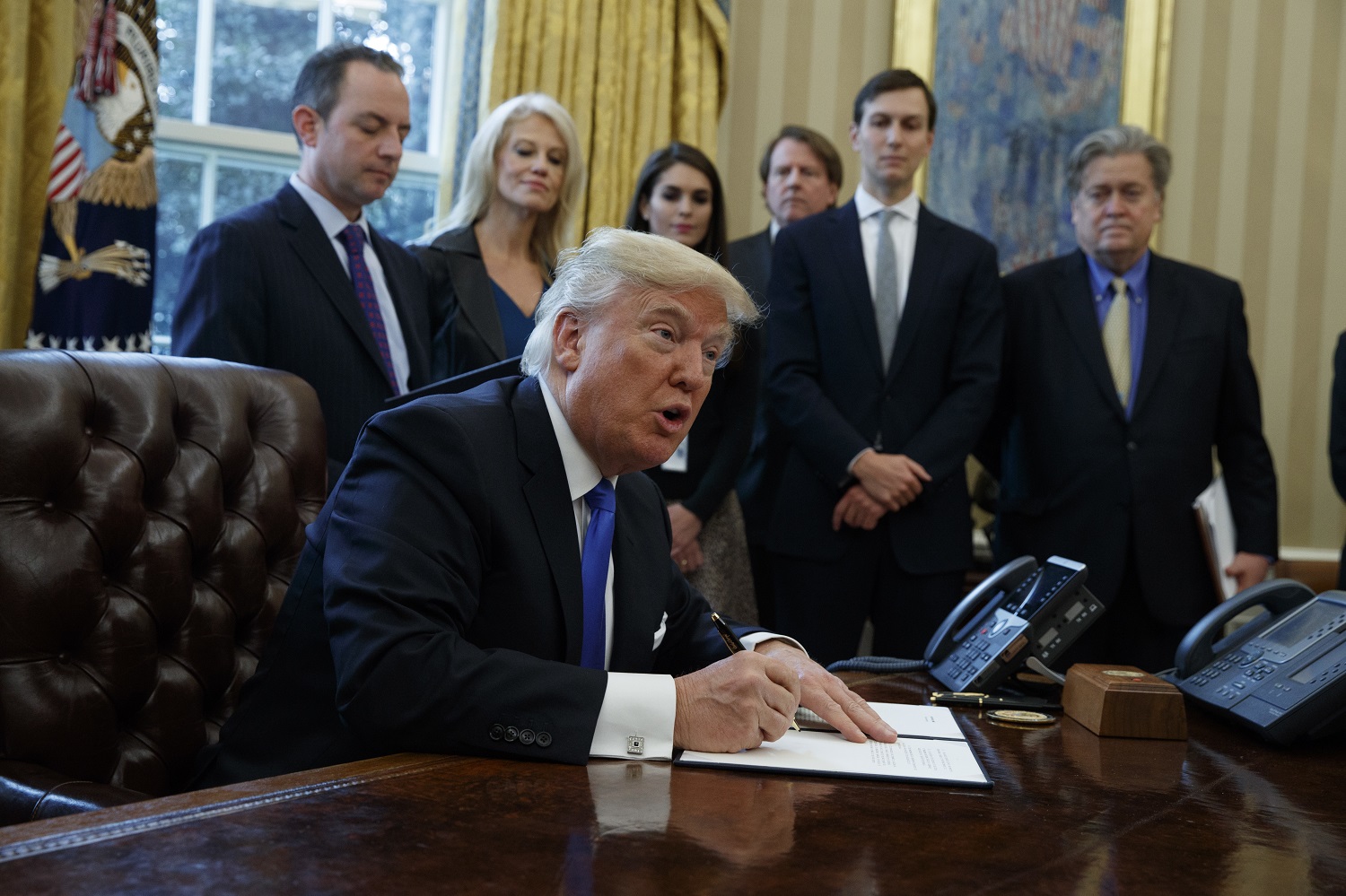
President Donald Trump signs an executive order on the Keystone XL pipeline, Tuesday, Jan. 24, 2017, in the Oval Office of the White House in Washington. (AP Photo/Evan Vucci)
The administration of President Donald Trump is reining in federal agencies, their message – and some science funding.
The new directives from various federal agencies have started to centralize the message and mission of the various agencies – including the Environmental Protection Agency and the U.S. Department of Agriculture.
The USDA’s Agricultural Research Service and its employees are all banned from sharing information with the press and public, according to a Monday email acquired and published online by BuzzFeed.
“Starting immediately and until further notice, ARS will not release any public-facing documents,” wrote Sharon Drumm, chief of staff for the Service. “This includes, but is not limited to, news releases, photos, fact sheets, news feeds, and social media content.”
All requests for public information are now going through the agency’s office of communications in Washington, D.C., the site reported.
The Environmental Protection Agency has frozen all its grant programs – and also prohibited any contact with the press and the public through releases, statements, social media blasts, and other forms of communication, according to another internal message obtained by The Huffington Post.
The EPA freeze also includes honoring existing contracts, according to ProPublica. The grants and expenditures include research funding, air quality monitoring, pollution cleanups, and other ongoing endeavors. The freeze was unveiled by an anonymous EPA staffer – considered unusual for a transition move of the sort. Myron Ebell, who led Trump’s EPA transition but who has since returned to the Competitive Enterprise Institute, told ProPublica the extent of the Trump administration’s actions to review all policies and expenditures is more extreme than in previous presidential transitions.
“This may be a little wider than some previous administrations, but it’s very similar to what others have done,” Ebell reportedly said.
Indeed, all previous presidential administrations have centralized information as they are shaped, to some degree.
President George W. Bush only began his transition in earnest in mid-December 2000, since Al Gore did not concede the close election until after a month had passed. But Bush quickly established protocols for external communications – and control of information was reined in to the topmost levels of the administration. As late as 2008, Bush’s designates reminded EPA staff to not talk to the press or congressional investigators – or even the agency’s own inspector general.
President Barack Obama and his administration pledged in their first 100 days in 2009 to proactively disseminate information through the Freedom of Information Act, to harness the power of social media, and other good-faith efforts to create a “new standard of openness.” Although social media and other avenues of information proved successful, the Obama transparency record was criticized in many circles, especially among reporters.
But Trump’s team is going further than ever before, critics said. The EPA silence is called a “blackout” by members of the Trump administration – and that is unprecedented, say opponents.
The executive director for the advocacy group Public Employees for Environmental Responsibility, Jeff Ruch, said the orders exceed those of prior presidential transitions.
“We’re watching the dark cloud of Mordor extend over federal service,” Ruch said today, referring to the evil kingdom in the epic fantasy, The Lord of the Rings.
The new Trump administration has also responded already to breaches of protocol. The National Park Service created some online buzz when it retweeted pictures of the smaller crowd size at Trump’s inauguration last Friday, as compared with Barack Obama’s 2009 inauguration. The missives apparently were criticized within, because just a day later, the agency officially apologized for the tweets.
“We regret the mistaken RTs from our account yesterday and look forward to continuing to share the beauty and history of our parks with you,” the account stated, before moving back onto park scenes.
Later on Tuesday, the official Badlands National Park Twitter account pushed out scientific facts about climate change, in apparent defiance of the Trump media blackout. But within hours, those messages were deleted.
The Associated Press contributed to this report.




